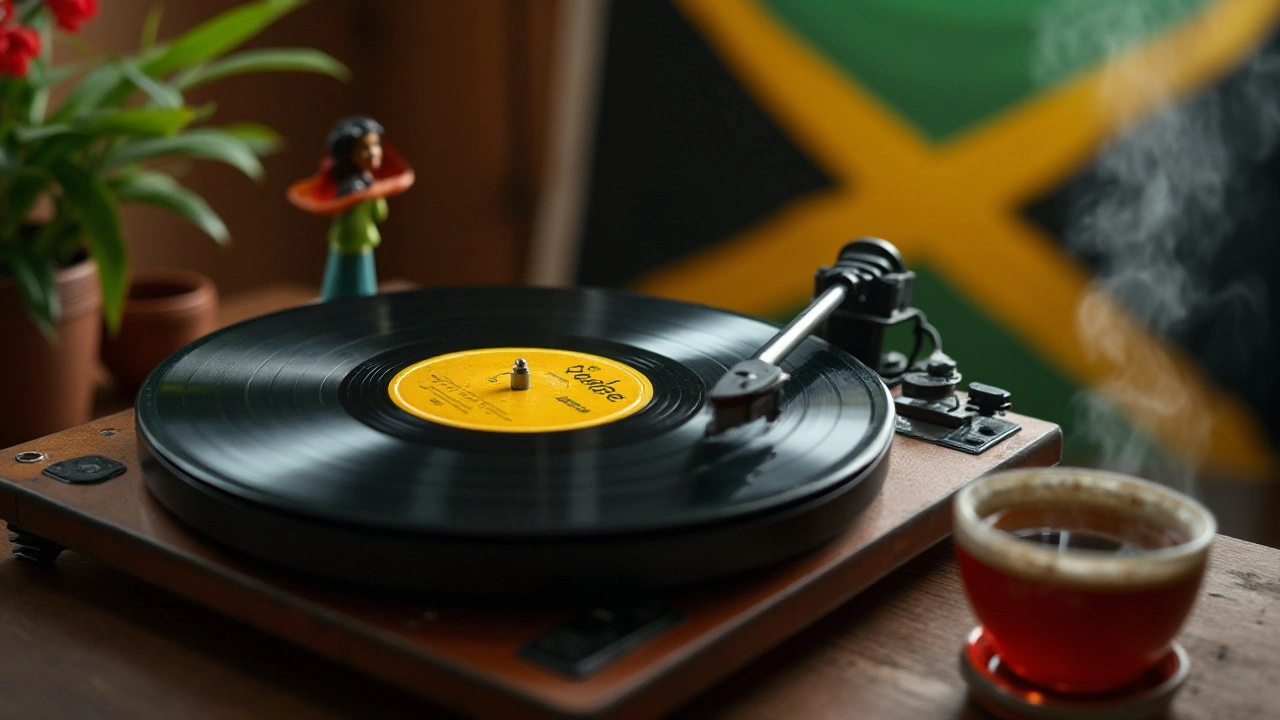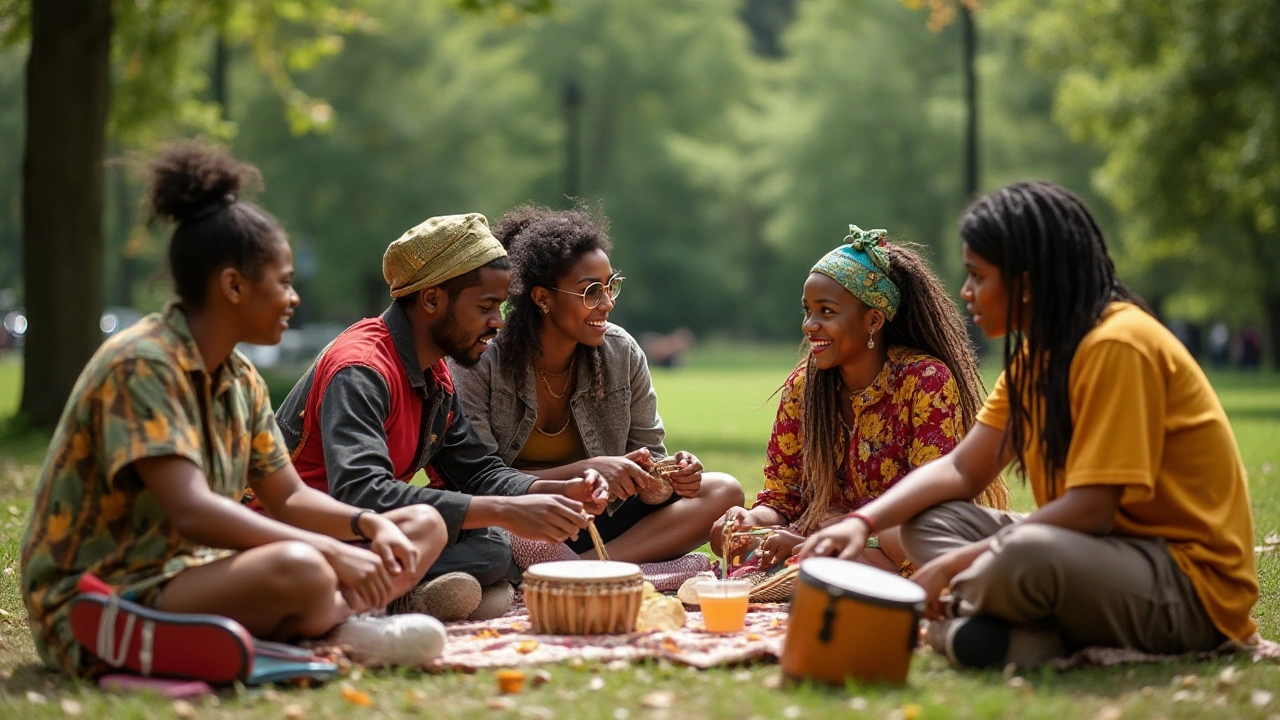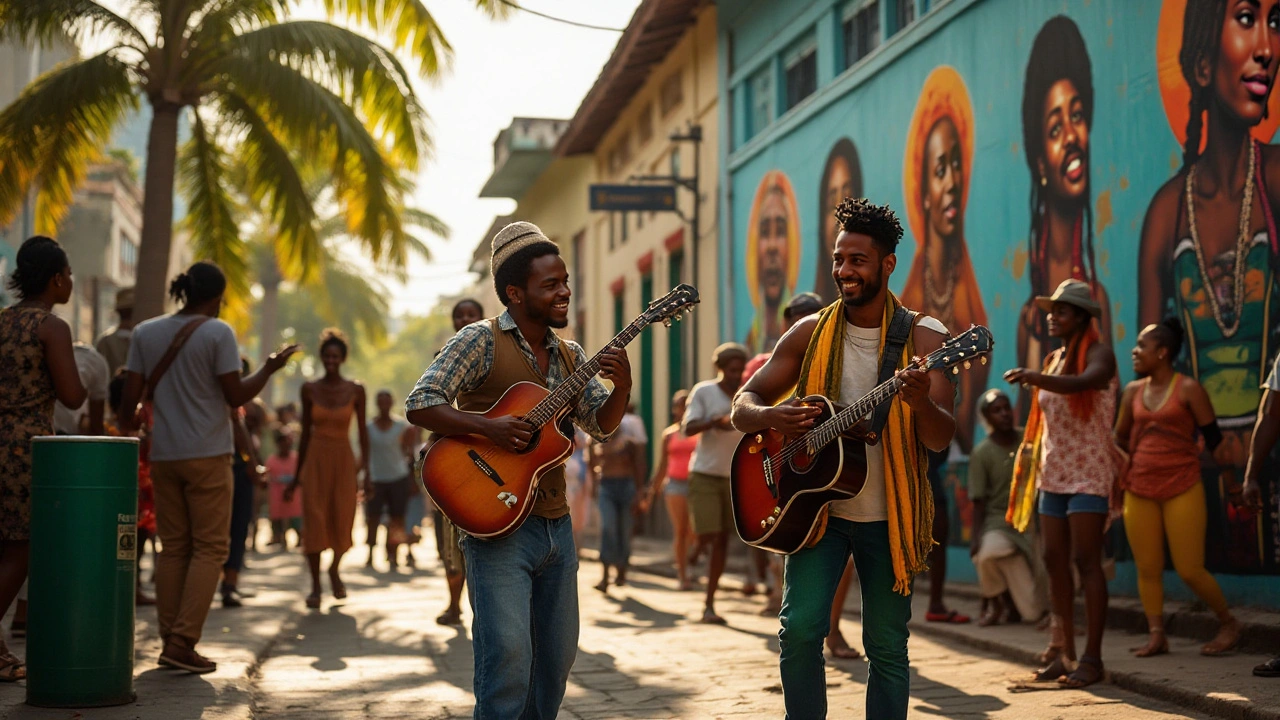Reggae music is more than just a genre; it's a movement rooted in hope and resilience. Originating from the vibrant streets of Jamaica in the late 1960s, reggae quickly grew into a global phenomenon, echoing cries for freedom and unity across the world.
The rhythm and messages woven into reggae's very fabric have transcended boundaries, making it the voice of change and optimism.
Whether it's the memorable tales told by iconic figures like Bob Marley and Peter Tosh or the influence reggae has wielded on social movements, this music continues to inspire and uplift. Join us as we dive into the world of reggae, celebrating its past as we look toward its future.
- Origins of Reggae
- Influential Artists and Their Stories
- Impact on Social Movements
- Reggae's Diverse Styles
- The Future of Reggae
Origins of Reggae
The emergence of reggae music tells a story of cultural fusion and the enduring spirit of a people. Unfolding in the late 1960s in Jamaica's bustling streets, reggae evolved from a blend of American jazz and rhythm and blues, combined with traditional Caribbean sounds. The genre was significantly influenced by earlier Jamaican music styles, particularly ska and rocksteady. These foundational elements crafted a unique sound that revolved around off-beat rhythms and syncopated basslines. As reggae grew, it embraced the intrinsic elements of African and Caribbean heritage, infusing them with themes of resilience and hope.
The heat of the tropical sun and the vibrant lifestyle on Jamaican shores played a crucial role in the music's development. During the social upheavals of post-independence Jamaica, reggae emerged as the heartbeat of social commentary. The music reflected and addressed the struggles of everyday life faced by the Jamaican people, who were then grappling with issues of poverty, systemic inequality, and racial injustice. This backdrop of struggle provided fertile ground for reggae to become a potent tool for change and a voice for the voiceless. An interesting fact often overlooked is that the term 'reggae' is believed to have been first coined in 'Do the Reggay' by Toots and the Maytals, capturing the essence of the rhythm that was being born.
As reggae's popularity soared worldwide, the legendary Bob Marley became one of its most poignant ambassadors. His music echoed tales of unity, love, and resistance, drawing global attention to issues of social justice. Marley, alongside other significant figures like Peter Tosh and Bunny Wailer, carried reggae beyond Jamaican shores, making it an international symbol of struggle and triumph. It's important to note that reggae's lyrics were deeply intertwined with the Rastafarian movement, which played an essential role in forming the genre's identity. The Rastafarian belief system, emphasizing equality and resistance against oppression, provided a spiritual framework that resonated with audiences far and wide. In fact, the steady rise of reggae brought about unity in diversity, as people from different backgrounds found a common ground in the music's messages.
"Reggae is a natural mystic, blowing through the air, touching all who open their ears." – Bob Marley
Reggae's influence quickly extended beyond music, impacting visual art, fashion, and literature. The genre's deep associations with cultural identity and resistance against socio-political challenges enriched its narrative. Festivals dedicated to celebrating reggae culture emerged around the world, showcasing not just the music, but the vibrant customs and traditions that accompany it. Today, these festivals continue to honor reggae as a living, breathing testament to hope and resilience.
By the late 1970s, reggae had cemented its place on the international stage. It influenced numerous artists across varied genres, inspiring musicians from rock, jazz, and hip-hop to incorporate reggae rhythms and messages into their own work. As with any influential art form, reggae has inspired and fostered countless derivatives and subgenres, from lovers rock to dancehall. The genre's expansion reflected its adaptability and enduring appeal, proving its strength to both uplift and unite people across borders through music.
Influential Artists and Their Stories
Reggae has given birth to some of the most influential artists in the world of music, with their stories deeply intertwined with the genre's success. At the heart of reggae’s enduring legacy lies Bob Marley, a name that commands respect and admiration globally. More than just a musician, Marley was an icon of hope, a beacon whose lyrics transcended cultural and geographical boundaries. With hits like "One Love," and "Get Up, Stand Up," Marley's songs would resonate with millions, promoting a message of peace and unity that was sorely needed during turbulent times worldwide.
Another legendary figure, Peter Tosh, was vital in shaping the confrontational spirit of reggae. A core member of The Wailers with Marley, Tosh’s solo career exploded with tracks such as "Legalize It" and "Equal Rights." Tosh used his platform to amplify calls for change, speaking against racial inequality and advocating for the legalization of marijuana. His work inspired those who faced oppression, giving them not just music to enjoy, but anthems to rally behind. Tosh’s fiery militancy, wrapped in reggae's seductive rhythms, gave voice to the voiceless and allowed his legacy to endure.
Moving beyond the titans of reggae, another influential name is the dynamic Jimmy Cliff. He remains a significant name in reggae, sporting a career that spans decades. Cliff was instrumental in bringing reggae to the international stage. Albums like "The Harder They Come" are testaments to his exceptional talent and ability to infuse reggae’s rhythmic charm with catchy lyrics that stick with the listener. The title track, along with "Many Rivers to Cross," almost manifests as a soul-stirring autobiography, detailing a journey filled with struggle, hope, and ultimate triumph.
“One good thing about music, when it hits you, you feel no pain.” - Bob Marley
As formidable for their musical output as for their personalities, these artists and numerous others helped reggae become a canvas for expression and resistance. The genre isn’t just vibrant chords set to rhythm but a vital medium for artists to tell their stories, advocate for societal change, and stamp their identities onto the music. The spirit of legends like Marley, Tosh, and Cliff lives on as their beats still inspire new generations, proving reggae's staying power.
Today, reggae continues to thrive and evolve, with artists like Chronixx, Protoje, and Koffee, who each carry the torch of their predecessors while infusing reggae with fresh energy and modern flair. Amid a musical landscape ever in flux, these trailblazers uphold reggae as a powerful testament to human perseverance and the enduring spirit of hope and resilience, ensuring the genre remains a force for good in the world.

Impact on Social Movements
It's almost magical how reggae music has transcended its cultural origins to become a melodious force for social change globally. This soulful genre, with its heartbeat-like rhythms, has become the soundtrack of revolutionaries and peace activists alike. In Jamaica, where it all began, reggae was born in the backdrop of social inequality, racial discrimination, and economic hardship. The music quickly became a voice for the voiceless, resonating deeply with the suffering of common people and inspiring them to stand up for their rights.
One of the pivotal ways in which reggae influenced social movements was through its profound association with the ideals of Rastafari. This spiritual and political movement advocated for the freedom and spiritual redemption of black people globally. Reggae became its natural ally. Artists like Bob Marley used their platforms to spread messages of 'One Love' and unity while simultaneously advocating for the marginalized and oppressed. Marley’s song "Get Up, Stand Up" is much more than an anthem; it's an urgent call to action, a reminder that change is something to be actively pursued. His music and his unwavering commitment to social justice earned him a legendary status that knew no borders.
Reggae’s impact, however, did not stop at the shores of Jamaica. Across Africa, this music genre found a receptive audience who saw their struggles and aspirations in Marley’s words and rhythms. During the apartheid era in South Africa, reggae songs were often played secretly to inspire hope and resistance. The music offered solace and encouragement to those fighting systemic racism and was a clandestine partner in the struggle for freedom and equality.
Global Influences and Icons
In fact, reggae remained a powerful ally in political movements around the world. The deep kinship it fostered among marginalized communities found its way into almost every corner where the fight for equality raged. The Rock Against Racism movement in the United Kingdom in the 1970s used reggae to unite people against the rising tides of hate. This collective's famous concerts embodied reggae's power to bridge divides and bring people together under the promise of equality and understanding.
Another remarkable impact of reggae is seen in its contribution to environmental movements. With its earthy beats and reflective lyrics, reggae has always possessed an inherent connection to nature and preservation. Songs like "Earth Crisis" by Steel Pulse are not just environmental calls to action but a lyrical reflection on the importance of safeguarding the planet, making reggae a unique ally in the fight for a sustainable future.
"Reggae is a music that resonates with people across the globe, not just for its rhythm and beat, but for its ability to speak to the truths many wish were never heard" - Chris Blackwell, famous music producer.
In a world increasingly driven by technological change, reggae’s grassroots messages are perhaps more crucial than ever. As people rally behind causes like climate change, social justice, and human rights, reggae stands as a timeless message of empowerment and resilience. The music that once rose from the Jamaican ghettos continues to remind us that, sometimes, change begins with a simple, heartfelt tune.
Reggae's Diverse Styles
Reggae music isn't just one sound; it's a rich tapestry of different styles, each with its own unique flair and story. Originating in Jamaica, reggae first emerged as a fusion of Mento, Ska, and Rocksteady, evolving into ten distinct rhythms that captivated audiences worldwide. Early reggae was marked by its bright and energetic tempos, but by the late 1960s, a slowed-down version began to take over the islands. This new sound, which came to be known as roots reggae, featured deeper bass lines and emphasized drum and percussion beats, creating a hypnotic, earthy vibe that resonated deeply with its audience. Unlike its predecessors, roots reggae went beyond entertainment, carrying powerful messages of social justice, resistance, and love.
As the genre continued to expand, new offshoots emerged, blending traditional reggae with other musical influences. Dancehall, for example, brought a high-energy, electronic sound to the reggae world, gaining immense popularity in the 1980s. This subgenre was characterized by its faster pace, digital instrumentation, and rhythmic vocals, providing a platform for artists to express vibrant commentary on everyday life, often in patios. Another significant style that grew from the reggae tree is Dub. Dub music emphasizes remixing techniques, focusing heavily on instrumental tracks, manipulating bass and drum effects, and experimenting with echo and reverb to create a more immersive listening experience. This innovative approach to production later influenced many popular genres like hip-hop and electronic music.
The multifaceted nature of reggae also reveals itself through lyrical content, which often explores themes ranging from spiritual reflection and

The Future of Reggae
As we look ahead, the future of reggae music appears brighter than ever, finding new expressions and evolving into diverse forms. Many young musicians across the globe are embracing reggae's rich tradition, blending it with different genres to create something entirely new. This innovation paves the way for fresh musical landscapes while staying true to the rhythmic pulse and socially conscious messages that reggae is known for. The genre continues to serve as a voice for the voiceless, spreading messages of peace, love, and unity in a time when they are needed most. This commitment to theme and harmony ensures that reggae will remain relevant, echoing its powerful roots while leading the charge into uncharted territory.
Technological advancements have also played a significant role in reggae's forward journey. With the global reach of the internet and the growing popularity of streaming services, reggae music is now more accessible than ever. Artists are tapping into these resources, allowing their music to reach audiences far beyond their local communities. This widened reach has led to a dynamic exchange of cultural influences, where artists from Africa, Asia, and Latin America infuse their own cultural elements into their music, contributing to reggae's ever-evolving soundscape. These efforts ensure that reggae not only survives but thrives, captivating hearts across continents.
The enthusiasm for reggae can be seen in the thriving festival circuits and the mushrooming reggae communities worldwide. Events like Rototom Sunsplash in Spain and Reggae Sumfest in Jamaica draw crowds by the thousands, celebrating the timeless appeal of this genre. Meanwhile, reggae musicians are increasingly collaborating with artists from different musical styles to expand their range and introduce reggae to new audiences. These cross-genre collaborations create symbiotic relationships that foster growth and innovation within the music scene, highlighting reggae's adaptability and enduring charm.
Reggae's potential future doesn't stop at music alone. Its core messages of social justice and resistance continue to resonate, engaging younger generations to become activists in their own right. The genre's advocacy for change has inspired many to stand up against injustices, championing causes ranging from equal rights to environmental conservation. In this progressive march, reggae remains a guiding light, encouraging listeners to reflect on the world around them and to strive for a brighter, more equitable future.
To encapsulate reggae's trajectory, we must celebrate its rich history while embracing the innovation that lies ahead. As it innovatively bridges cultural gaps and remains steadfast in its mission to inspire change, reggae's journey is a testament to its resilience. In the words of Peter Tosh, "Reggae is the king's music, the people's music, pure music," a powerful echo that continues to inspire and uplift us, guiding us toward a hopeful tomorrow.

